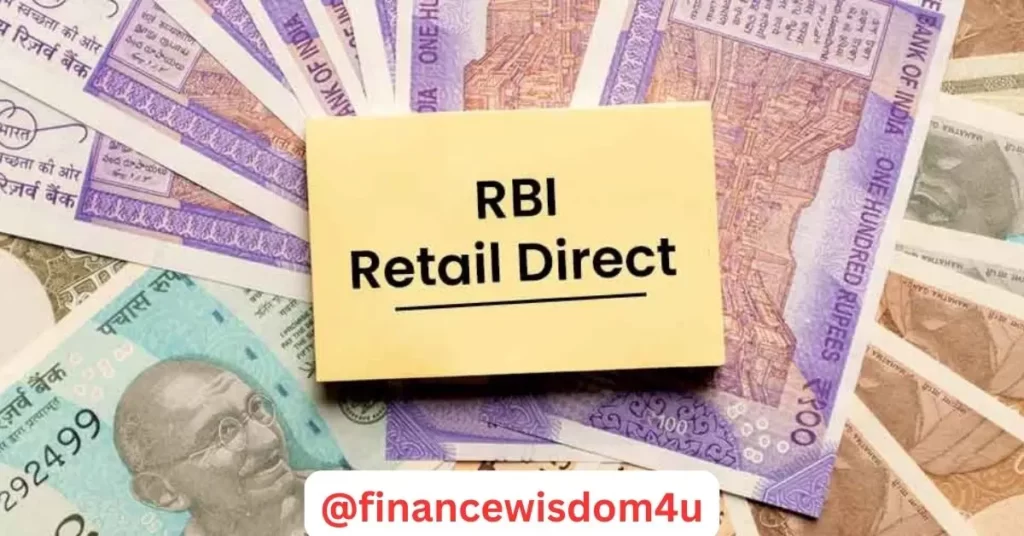Introduction
The Reserve Bank of India (RBI) has made investing in G-Secs easier for individual investors by introducing the Retail Direct Scheme, launched in November 2021 by Prime Minister Narendra Modi. Under this initiative, individuals can effortlessly buy and sell G-Secs without involving middlemen like brokers and mutual funds.
Government Securities are debt instruments issued by a government to raise funds for public spending or to manage its financial activities. These securities are low risk investment as they are backed by sovereign.
In this blog we will understand what is RBI’s Retail Direct Scheme – Pros and Cons and how to use it.

What is RBI Retail Direct Scheme?
It is an online platform where the retail investor can buy and sell government securities. As explained earlier it is designed to break down barriers, providing a direct reach to all the government securities. Under this scheme, investors can open a “Retail Direct Gilt (RDG)” account with the RBI to easily buy and sell government securities.
What is the purpose of the RBI Retail Direct Scheme?
The Retail Direct Scheme aims to make it easier for regular people to invest in government securities. Its objectives include empowering individual investors, simplifying the investment process, and increasing the overall participation of people in the government securities market. By cutting out middlemen, it provides direct access for individuals to buy and sell government securities, promoting financial inclusion and enhancing financial literacy.
What are the benefits of the RBI Retail Direct Scheme?
- Easy Access to Government Securities: Investors can directly invest in government securities without the need for middlemen.
- Simplified Process: The investment process becomes more straightforward and accessible.
- Diverse Investment Portfolio: Retail investors can diversify their investment portfolios by easily including government securities in their financial assets.
- Transparent Transactions: Direct engagement ensures clear and transparent transactions.
- Cost Savings: Cutting out intermediaries reduces costs for investors. Also, there is no charge associated with the Retail Direct Scheme.
- Potential for Better Returns: By participating directly in government securities, retail investors may access potential returns associated with these low-risk instruments.
- Enhanced Financial Literacy: Investors can enhance their financial knowledge as they navigate government securities market.
- Participating in Primary Issuance: Investors have the opportunity to submit non-competitive bids in the primary issuance of all central government securities, including T-bills and SGBs, as well as securities issued by various state governments.
- Access to the Secondary Market: Under this scheme, investor.
What is RBI Retail Direct Gilt Account?
The RBI Retail Direct Gilt Account is a user-friendly online account offered by the Reserve Bank of India. It allows regular people to directly buy and sell government securities without needing brokers or mutual funds. Investors can manage their government securities portfolio through this account, promoting accessibility and simplicity in the financial market.
What is Main Features of RBI Gilt Account?
- Allows individual to buy G-Sec directly in the primary market.
- Allows buying and selling of G-Sec in the secondary market
- It also helps with account maintenance services like accessing the account statement, nomination facilities, grievances, gift transaction, managing one’s profile etc.
Who can open RBI Retail Direct Account?
Every retail investor or individual, Non-Resident retail investors can open account in the Retail Direct Gilt Account (RDG) but will need the following:
- Rupee Saving bank account maintained in India
- Permanent Account Number (PAN)
- Officially Valid Documents (OVDs) for KYC
- Valid email id and
- Registered Phone Number
A RDG Account can be opened individually or jointly with other investors who meet the eligibility criteria.
What are the Charges/Fees associated with the Retail Direct Gilt Account?
No fee will be charged for opening and maintaining the RDG Account. No fee will be charged for submitting bid by the investor in the primary auction.
What are the Government Securities that I can invest via Retail Direct?
In RBI Retail Direct Bond Scheme , investors invest in following Government Securities
- Government of India Treasury Bills (T-Bills): Treasury Bills, commonly known as T-Bills, are short-term debt securities issued by a government to raise short-term funds to meet immediate financial needs.
- Government of India dated securities (dated G-Sec): It is commonly referred to as Dated G-Secs, are fixed-interest debt instruments issued by the Government of India. These securities have a specified maturity date and pay periodic interest at a fixed coupon rate until maturity.
- State Development Loans (SDLs): State government to meet their financial need also raise funds like central government and issue financial instrument and this financial instrument is called State Development Loans.
- Sovereign Gold Bonds (SGB): SGB are financial instruments issued by the Government of India, allowing investors to invest in gold in a paper or electronic form
What is the procedure for Opening a Retail Direct Gilt Account?
- RBI Retail Direct Scheme Registration : Eligible Investors may login to RBI Retail Direct Gilt Account online portal –https://rbiretaildirect.org.in and register using the Registration link to begin the RBI Gilt Account opening process.
- To open an RBI Retail Direct Gilt Account, the investor will have to furnish details like full name, PAN, mobile number, e-mail address, residential address, savings bank account number, etc. and specify a login name. Mobile number and email address will be authenticated using OTP and all further customer requests and services will be OTP based.
- For joint accounts, the PAN, e-mail address and phone number of both holders will be required.
- Once these details have been provided, you will get a reference number to track your application.
- You may now initiate your Know Your Customer (KYC) verification process.
- In case of joint accounts, the KYC verification will be done for both the holders.
- It will be mandatory for the investor to fill in the nomination details at the time of opening of the account.
- The savings bank account of the customer will be linked to their Retail Direct account by crediting a token amount into their bank account and verifying the same.
- Once the KYC is successful, an RDG account will be opened in the name of the investor(s).
- Information related to account number, login id & password to access the Online Portal will be made available to the customer on their registered e-mail id.
- In case of KYC failures, the individual can make new application or resubmit application after making necessary changes.
How can I buy and sell securities through Retail Direct platform?
For buying securities there are two ways:
- Participate in the primary auctions of dated G-Sec, T-Bills, and SDLs by submitting a bid (Non-competitive segment only, indicating the desired amount without specifying a price). For Sovereign Gold Bonds (SGBs), you can submit a bid during the subscription windows announced by RBI on its website.
- Place a buy quote on the secondary market portal.
To sell securities, you can enter a sell order in the secondary market portal. Ensure that the security is present in your account before initiating the sale.
Conclusion
This initiative is like a gift from RBI to the Retail investor. RBI has eliminated the need for intermediaries such as brokers and mutual funds and simplified the investment.
Q&A :
1. What is the Benefit of ‘RBI Retail Direct Online Portal’?
RBI Retail Direct Scheme Portal provides investors to purchase and sell Government securities online in primary and secondary markets. ‘RBI Retail Direct Gilt Accounts’ make investing in government bonds more affordable and secure. ‘RBI Retail Direct Gilt account opening online’ process and it is very simple.
2. Is RBI Retail Direct Genuine?
Yes, RBI Retail Direct Scheme Portal is a solid option if you want to invest in and hold Central and State government bonds directly.
3. Is RBI Retail Direct Scheme Safe?
Yes, Safe and secure . Government securities are considered secure investments as the Government of India backs them. Hence, RBI Retail investors can be assured of the safety of their RBI Retail investment (Government Bonds) as these are risk-free and carry no credit risk.
4. Is RBI Retail Direct free?
Yes, It is free. There is no fee for opening and maintaining a ‘Retail Direct Gilt account’ with RBI. The RBI Direct Investors will charge no fee for submitting bids in the primary auctions. Only payment gateways, etc charges during transactions.
5. What is the fee of RBI Retail Direct?
There is no fee for opening and maintaining a ‘Retail Direct Gilt account’ with RBI.
6. Is it good to invest in RBI Retail Direct?
Yes, through the RBI Retail Direct Online Portal, one is able to invest in Government Security Bonds, which are safer and offer better interest rates than fixed deposits.
7. How is interest paid in RBI Retail Direct?
RBI Retail Direct Scheme Rate of Interest : The interest rate for the RBI Retail Direct Scheme Bonds is determined by the auction process, where investors bid for the securities (secondary market). The interest rate is fixed for the entire bonds tenure and paid semi-annually or annually.
8. What is the limit of RBI Retail Direct?
Through Unified Payment Interface (UPI) can be used to invest up to Rs. 5 lakh in Government Securities through RBI Retail Direct Online Platform. However in NACH mode there higher limit of up to Rs 1 crore. [ Article updated on 7th Dec 2023 ]. Learn more – NACH mode of payment
Learn more about Government Securities and join our journey of financial education.
